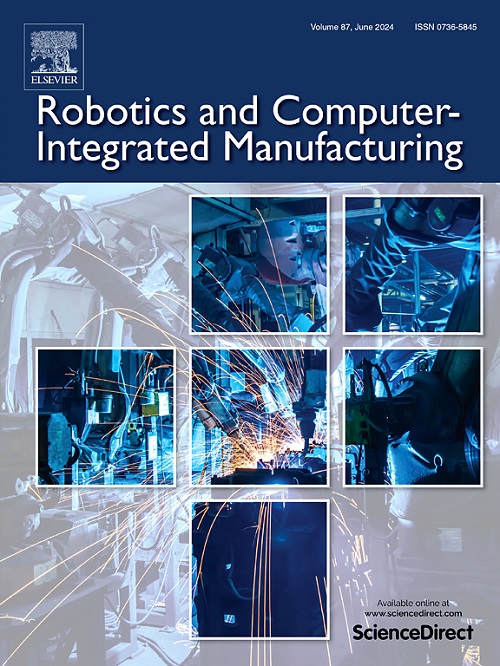Demand-driven hierarchical integrated planning-scheduling control for a mobile robot-operated flexible smart manufacturing system
IF 11.4
1区 计算机科学
Q1 COMPUTER SCIENCE, INTERDISCIPLINARY APPLICATIONS
引用次数: 0
Abstract
The rapid advancement of Industry 4.0 has transformed manufacturing, giving rise to Flexible Smart Manufacturing Systems (FSMS) capable of adapting to fluctuating market demands and operational uncertainties—essential for achieving mass customization. However, conventional approaches that separate long-term planning from real-time scheduling struggle to meet the demands of modern manufacturing environments, particularly in adapting to frequent demand fluctuations, managing system complexity, and ensuring rapid responsiveness. To address this challenge, this paper presents a demand-driven hierarchical framework that integrates planning and scheduling for flexible smart manufacturing, enabled by a mobile, multi-skilled, robot-operated system. First, a novel system identification model is developed using behavioral cloning to extract essential system properties that inform decision-making. Next, a coupled dual-loop control structure is introduced: an outer planner loop optimizes robot configurations based on demand forecasts, while an inner scheduler loop dynamically adjusts robot assignments in response to unexpected disruptions. The control strategy leverages the System Property-Infused Multi-Agent Deep Deterministic Policy Gradient (P-MADDPG) algorithm, which integrates dynamic system properties to improve adaptability and decision-making in complex environments. Extensive experiments are carried out to demonstrate the framework's effectiveness in adapting to frequently shifting demands, minimizing resource waste, and achieving superior performance with higher throughput compared to existing approaches, thereby providing a robust solution for integrated planning and scheduling in personalized production.
移动机器人柔性智能制造系统的需求驱动分层集成计划调度控制
工业4.0的快速发展已经改变了制造业,产生了能够适应波动的市场需求和运营不确定性的柔性智能制造系统(FSMS),这对于实现大规模定制至关重要。然而,将长期计划与实时调度分开的传统方法难以满足现代制造环境的需求,特别是在适应频繁的需求波动、管理系统复杂性和确保快速响应方面。为了应对这一挑战,本文提出了一个需求驱动的分层框架,该框架集成了灵活智能制造的计划和调度,由移动、多技能、机器人操作的系统实现。首先,建立了一种新的系统识别模型,利用行为克隆提取系统的基本属性,为决策提供信息。其次,引入了耦合双环控制结构:外部规划器环根据需求预测优化机器人配置,而内部调度器环根据意外中断动态调整机器人分配。该控制策略利用了系统属性注入的多智能体深度确定性策略梯度(P-MADDPG)算法,该算法集成了动态系统属性,以提高复杂环境下的适应性和决策能力。大量的实验证明了该框架在适应频繁变化的需求,最大限度地减少资源浪费以及与现有方法相比实现更高吞吐量的卓越性能方面的有效性,从而为个性化生产中的集成计划和调度提供了强大的解决方案。
本文章由计算机程序翻译,如有差异,请以英文原文为准。
求助全文
约1分钟内获得全文
求助全文
来源期刊
CiteScore
24.10
自引率
13.50%
发文量
160
审稿时长
50 days
期刊介绍:
The journal, Robotics and Computer-Integrated Manufacturing, focuses on sharing research applications that contribute to the development of new or enhanced robotics, manufacturing technologies, and innovative manufacturing strategies that are relevant to industry. Papers that combine theory and experimental validation are preferred, while review papers on current robotics and manufacturing issues are also considered. However, papers on traditional machining processes, modeling and simulation, supply chain management, and resource optimization are generally not within the scope of the journal, as there are more appropriate journals for these topics. Similarly, papers that are overly theoretical or mathematical will be directed to other suitable journals. The journal welcomes original papers in areas such as industrial robotics, human-robot collaboration in manufacturing, cloud-based manufacturing, cyber-physical production systems, big data analytics in manufacturing, smart mechatronics, machine learning, adaptive and sustainable manufacturing, and other fields involving unique manufacturing technologies.

 求助内容:
求助内容: 应助结果提醒方式:
应助结果提醒方式:


